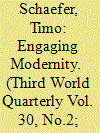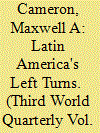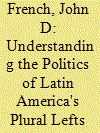|
|
|
Sort Order |
|
|
|
Items / Page
|
|
|
|
|
|
|
| Srl | Item |
| 1 |
ID:
086012


|
|
|
|
|
| Publication |
2009.
|
| Summary/Abstract |
The Product (RED) initiative was launched by Bono at Davos in 2006. Product RED is 'a brand created to raise awareness and money for the Global Fund to Fight AIDS, Tuberculosis and Malaria by teaming up with iconic brands to produce RED-branded products'. With the engagement of American Express, Apple, Converse, Gap, Emporio Armani, Hallmark and Motorola, consumers can help HIV/AIDS patients in Africa. They can do so simply by shopping, as a percentage of profits from Product (RED) lines goes to support the Global Fund. In this article we examine how the corporations that are part of this initiative use RED to build up their brand profiles, sell products and/or portray themselves as both 'caring' and 'cool'. We also show that, more than simply being another example of cause-related marketing (like the pink ribbon campaign or the ubiquitous plastic armbands), RED engages corporations in profitable 'helping' while simultaneously pushing the agenda of corporate social responsibility (CSR) towards solving the problems of 'distant others'
|
|
|
|
|
|
|
|
|
|
|
|
|
|
|
|
| 2 |
ID:
086011


|
|
|
|
|
| Publication |
2009.
|
| Summary/Abstract |
'Women's empowerment', as used by international development organisations, is a fuzzy concept. Historical textual analysis and interviews with officials in development agencies reveal its adaptability and capacity to carry multiple meanings that variously wax and wane in their discursive influence. Today a privileging of instrumentalist meanings of empowerment associated with efficiency and growth are crowding out more socially transformative meanings associated with rights and collective action. In their efforts to make headway in what has become an unfavourable policy environment, officials in development agencies with a commitment to a broader social change agenda juggle these different meanings, strategically exploiting the concept's polysemic nature to keep that agenda alive. We argue for a politics of solidarity between such officials and feminist activists. We encourage the latter to challenge the prevailing instrumentalist discourse of empowerment with a clear, well articulated call for social transformation, while alerting them to how those with the same agenda within international development agencies may well be choosing their words with care, even if what they say appears fuzzy.
|
|
|
|
|
|
|
|
|
|
|
|
|
|
|
|
| 3 |
ID:
086018


|
|
|
|
|
| Publication |
2009.
|
| Summary/Abstract |
Most analyses of the recent indigenous mobilisations in Bolivia and Ecuador (as well as other Latin American countries) have sharply divided the new indigenous politics from earlier class-based political projects of the left. The emergence and mass-appeal of indigenous movements, in these analyses, are rooted in ethnic and cultural cleavages between indigenous peoples and the rest of Bolivian and Ecuadorean society. This article argues that a political interpretation of indigenous movements in these countries gives a more coherent explanation for their historical trajectories as well as their present situation, in particular their high degree of articulation with other popular political actors. Its historical section describes the emergence of indigenous movements in Bolivia and Ecuador as part of an engagement with modernity that began in the first half of the twentieth century as part of the cross-ethnic projects of unions and radical parties of the traditional left and put indigenous communities into positive relationships to the modernizing Bolivian and Ecuadorean states.
|
|
|
|
|
|
|
|
|
|
|
|
|
|
|
|
| 4 |
ID:
086019


|
|
|
|
|
| Publication |
2009.
|
| Summary/Abstract |
This article examines the extent of change under Latin American left governments by assessing their actions on women's and lesbian, gay, bisexual and transgender (LGBT) rights. To provide a historical context, it first offers an overview of the relationship between feminist movements and the left. It then employs a four-country comparison of Brazil, Bolivia, Chile and Venezuela on women's socioeconomic status; feminist state-society relations; women's representation in national decision-making positions; legislation on violence against women; reproductive rights; and sexual rights. It concludes that standard political and economic divisions among the cases do not explain their response to the demands of feminists and LGBT activists. While governments have improved women's status and inclusion, the transformation of gender and sexual power relations remains unfinished.
|
|
|
|
|
|
|
|
|
|
|
|
|
|
|
|
| 5 |
ID:
086014


|
|
|
|
|
| Publication |
2009.
|
| Summary/Abstract |
In the wake of a series of electoral victories, often dubbed a 'pink tide' by the media, there has seldom been a moment more propitious for the diverse parties, movements and leaders of the Latin American Left. Yet the Left faces daunting challenges, and the diversity of responses to these challenges suggests that there is not one but many left turns. This article, like the collection of essays that it introduces, critiques conventional distinctions between 'populist' and 'social democratic' currents of the Latin American Left, and argues that the left turns are best described as a multiplicity of disparate efforts to reopen or re-found the constitutional order or social pact. These efforts reveal deep-seated tensions between the Latin American Left and liberalism. The analysis reviews these tensions as well as some of the central policy challenges facing progressive governments and the relationships between social movements and political representation
|
|
|
|
|
|
|
|
|
|
|
|
|
|
|
|
| 6 |
ID:
086015


|
|
|
|
|
| Publication |
2009.
|
| Summary/Abstract |
In rapid succession leftwing parties have been elected to government in some of the most important countries in the Latin American region. I challenge the view that there are two distinct variants of the left-one populist, the other social democratic-and argue that variation on the left reflects the diverse conditions under which these forces emerge and evolve. I outline common features shared by the left in Latin America; suggest how the concept of populism and analysis of social movements can help explain this variation; and show how the left's commitment to egalitarianism, balancing markets, and, in some cases, its appeals to the constituent power of the people enabled it to benefit from disillusionment with the results of neoliberalism, the poor performance of democratic governments in Latin America, and the evolving international context.
|
|
|
|
|
|
|
|
|
|
|
|
|
|
|
|
| 7 |
ID:
086017


|
|
|
|
|
| Publication |
2009.
|
| Summary/Abstract |
The left turns represent a 'second incorporation crisis' for Latin American countries. The discontent emerging from the effects of market reforms implemented in the context of weak states and highly unequal societies has fuelled this crisis, along with citizens' widespread alienation with traditional parties and political elites. The left turns also yield three interrelated paradigmatic crises: one relates to political and economic praxis in the region, another concerns academic interpretations of the political economy of democracy and development for Latin America, and yet another concerns policy-making prescriptions. The failure to predict the left turn epitomises conventional wisdom's shortsightedness, which is also present in the now dominant interpretations on the current governing lefts in the region. A normative predilection for market economies and liberal democracy embedded in the theoretical and methodological toolbox of dominant approaches causes this myopia. The paper justifies this diagnostic and derives implications for future research
|
|
|
|
|
|
|
|
|
|
|
|
|
|
|
|
| 8 |
ID:
086009


|
|
|
|
|
| Publication |
2009.
|
| Summary/Abstract |
The North-South divide is counterproductive to the generation of norms and policies geared toward ensuring human security in a globalising world. Moreover, developing countries productively abandon Southern solidarity when it is in their perceived interests to do so. This article provides an historical overview of the origins of the geographical labels attached to the two main groups of countries and examines how the various constructed roles on the international stage in the global theatre are played by actors from the two major troupes, North and South. It concludes with some encouraging examples of changed stances within the supposedly ironclad categories.
|
|
|
|
|
|
|
|
|
|
|
|
|
|
|
|
| 9 |
ID:
086016


|
|
|
|
|
| Publication |
2009.
|
| Summary/Abstract |
This article explores the academic and public debate on the politics of Latin America's twenty-first century turn towards the left. It rejects dichotomous categorisations of 'social democratic' and 'populist' lefts as a disciplinary move by neoliberals that appeals to entrenched liberal predispositions. It suggests that such classificatory taxonomies are directly linked to an impoverished notion of the political, in which a politics of exalted expertise and enlightenment, based on reason, rationality and objectivity is juxtaposed against a lesser sphere of emotion, passion and 'personalism'. This underlying dualism, which permeates academic disciplines and crosses lines of ideology, tracks established markers of hierarchical distinction in societies profoundly divided along multiple lines of class and cultural capital. This is explored through an analysis of the discourse of Ch vez vis-a-vis Lula, while offering an appreciation of the subaltern origin of Lula's distinctive style of political leadership, from trade unionism to the presidency, based upon the creation of spaces of convergence.
|
|
|
|
|
|
|
|
|
|
|
|
|
|
|
|
|
|
|
|
|